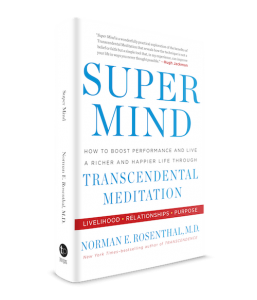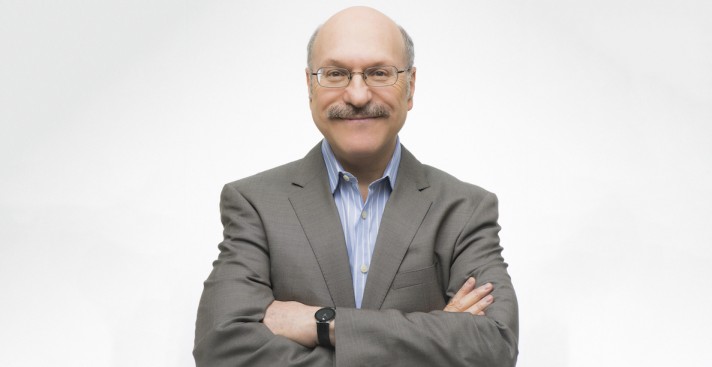In my new book Super Mind, I describe how consciousness expands and grows over time in those who practice TM regularly. Although I present scientific evidence for the growth of consciousness, what I enjoyed most in writing the book were those fascinating people I encountered in whom the growth of the Super Mind was most vivid and transformational. I would like to share with you one example: Megan Fairchild, principal ballerina in the New York City Ballet.
Before talking to Megan, who is a charming and articulate young woman, I had no idea how competitive the world of professional ballet is. People have to compete at multiple levels until they reach the pinnacle of excellence, which the New York City Ballet represents. And even then, very few achieve the status of principal dancer, most ending up in the chorus. Yet Megan is so talented and disciplined that she attained this highest honor in an elite institution.
At a certain point, however, trouble struck. Megan began to develop fainting episodes that came on unpredictably and filled her with dread about fainting during a performance. Others shared her concerns, and it was unclear how best to proceed. It was then that her ballet mistress made an unconventional suggestion: What about TM? It turned out that she herself had been practicing TM for many years, which gave her confidence in the technique.
Megan followed the suggestion and within days experienced the relief that so many TM practitioners will recognize. She felt the calmness settle into her body, and the fainting episodes stopped completely. In fact, on one occasion, when her dog bit her finger and drew blood, Megan felt the early warning signs of a fainting spell begin to come over her and then, as if by magic, just ebb away. It seemed like a miracle.
And if TM had done nothing more than that, it would have already made a huge difference in the life of this brilliantly talented young woman. Yet, as the following excerpt from Super Mind shows, there were even more gifts to be enjoyed.
Word got around that a new Broadway revival of On The Town was looking for a ballerina who could also act and sing well enough to handle a lead role. Others in the New York City Ballet had already auditioned for the part when, at the last minute, Megan was asked to audition as well. Although flattered, Megan knew that she was afraid of speaking in public, not to mention singing. In fact, on a previous occasion, when she had been required to talk about a small piece she was about to dance, she describes it as “my worst nightmare – to talk and be human, then dance.” In earlier times, given such powerful fears, auditioning for Broadway would have been unthinkable. But here she was, planning to audition – “jumping off a cliff.”
She credits TM with enabling her to do so. How might TM have made such a plunge possible?
All her life Megan had been a perfectionist. Even as a child, she would plan out her day in minute detail. On “Hello Kitty” paper, which her mother has kept from her childhood, The young Megan had written, “8 o’clock wake up, 8:15 go downstairs eat breakfast, 8:20 read a book.” Her mother recalls her throwing a jack-in-the-box across the room if it didn’t pop up when she thought it would. Her world had to be, above all, predictable. If she colored outside the lines, she would throw the whole paper away and say she wanted to start her whole life over. Although Megan’s perfectionism was ideal for a career in ballet, it was not conducive to taking risks or experimenting with new art forms.
TM changed all that. Things no longer needed to be perfect. Risks were opportunities – as were the inevitable small “failures” that occur along the way.
Here’s how she puts it:
“TM made me aware that the opportunity to audition was a once-in-a-lifetime thing. Instead of thinking, “Oh I can’t do that,” and just missing it – which I know I would have done before TM – I seized the day in a way that I had never done before. And it led to an unbelievable experience.
“I approached auditioning for Broadway as an exercise in being out of my comfort zone. It takes guts to do that. You have to be in an open place – and not afraid, even though it felt like I was jumping off the edge of a cliff. I worked with an acting coach to put the scene together and with a Broadway actress who’s a great singer to help me with the song. I did the audition and got the part right there in the room, which is not at all common. It was pretty cool.”
When I asked Megan how she felt about the risk of venturing into such a different career direction, she replied:
“I have never thought of myself as a risk-taker. And I don’t even see what I’ve done as having taken a risk. TM has completely changed the way I look at these things. And because I don’t see them as risks—I only see them as amazing opportunities, like what-have-you-got-to-lose opportunities—I can easily think of them without much anxiety. So if they don’t go well, the exercise of trying that new thing was worth it in and of itself.
“I really believe that people who succeed in anything are those who are okay with not always being perfect – those who have failures along the way, then pick themselves up and try again. And TM is perfect for that because every day you’re practicing just accepting yourself. You go back into your meditation – and back to your core. Whatever happened is past – and you feel fresh to start again.
“And it’s been crazy being in this Broadway world and having a party every night. I look at my Broadway year as the time of my life. It’s been like dessert, like the cherry on top.”
Excerpted with permission from chapters of SUPER MIND by Norman E. Rosenthal, MD, from TarcherPerigee, a division of Penguin Random House. Copyright 2016, Norman Rosenthal.
I love Megan’s story because it shows how the subtle but profound benefits of the TM technique exert their effects on a person’s life. Initially there is often relief of stress, decreased anxiety, and greater resilience. These changes are often followed by expansion of consciousness and further personal development. The Super Mind, it seems, just keeps on growing.

Dr. Norman Rosenthal—internationally acclaimed psychiatrist, researcher, educator, and author explains how the Transcendental Meditation (TM) technique can help develop your “super mind.” The New York Times-bestselling author explores how the TM technique permanently expands your consciousness, resulting in extraordinary success and fulfillment. Dr. Rosenthal shows how this incredibly simple, twice-daily practice can consistently improve your state of mind throughout the day—elevating you to a state of unshakable, peak performance and unbounded awareness.




